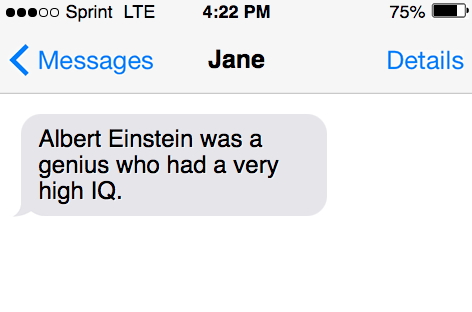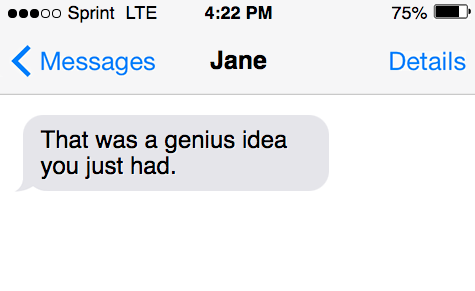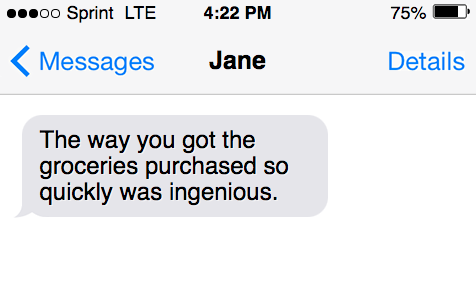Is it genius or genious? These two words are frequently confused. And create grammatical issues when writing English. What’s the difference between these two words? Is one correct and the other incorrect?
To learn more about the differences between genius and genious, continue reading this article…
Which is correct, genius or genious?
Genius is the correct word to use in the English language. It is often confused with the word “genious.” This is because the word “ingenious” contains an “iou” form in the word. Both genius and ingenious have very similar meanings, causing the confusion.
Genius definition
Genius, the word, can act as both a noun and an adjective. In most cases, we refer to “genius” in the noun form. It is a characteristic of original and exceptional insight in the performance of art of endeavor (that greatly surpasses expectations).
| Word | Definition |
| Genius (noun) /ˈjēnyəs/ | exceptional intellectual or creative power or other natural ability. |
| Genius (adjective) /ˈjēnyəs/ | very clever or ingenious. |
Often, when we think of the word genius, we think of Albert Einstein, one of the most famous geniuses to live.
Tip: When trying to pluralize and show possession of the word “genius,” the correct form is geniuses (the plural noun form).
What does “genious” mean?
The word “genious” is a common misspelled word trying to refer to the base form “genius.” In many cases, the word “genious” becomes a misspelling because the word “genius” [in pronunciation], sounds very similar to having an “o” letter inside of it.
Why is “genious” a misspelling?
The word ingenious, which refers to something being clever, contains an “o” in the word form. For example, if we remove “in” from the word form, we are left with “genious.” Making it highly confusing when referring to something that’s “genius” and “ingenious”—both referring to something that is exceptional (in terms of insight or knowledge).
How to use genius correctly
Genius can function as both an adjective and a noun.
Here is how genius is used as a noun:
- Albert Einstein was a genius who had a very high IQ.
- Your son tested very highly on the math test, he may be a genius.
- Whenever I think about why we have airplanes, I think about how much genius went into the original conception.

Here is how genius is used as an adjective:

What about ingenious?
Ingenious is an adjective that refers to an aptitude for invention or creation. It refers to something that is original, clever, and resourceful.
Here are example sentences using “ingenious”:
- The way you got the groceries purchased so quickly was ingenious.
- I never thought to put my milk and coffee together, that was ingenious.
- We would have never thought to pursue that venture, it was ingenious.

Conclusion
Remember, the correct spelling is “genius,” there is no “O” in the word “genius.” To remember, simply think about how “U” are a genius. And that there is no “O” letter in the “U.” This is called a mnemonic device. And is used to help remember critical thoughts and ideas.
| Word | Correct / Incorrect |
| Genius (noun) /ˈjēnyəs/ | Correct |
| Genious | Incorrect |
Inside this article
Fact checked:
Content is rigorously reviewed by a team of qualified and experienced fact checkers. Fact checkers review articles for factual accuracy, relevance, and timeliness. Learn more.
Core lessons
Glossary
- Abstract Noun
- Accusative Case
- Anecdote
- Antonym
- Active Sentence
- Adverb
- Adjective
- Allegory
- Alliteration
- Adjective Clause
- Adjective Phrase
- Ampersand
- Anastrophe
- Adverbial Clause
- Appositive Phrase
- Clause
- Compound Adjective
- Complex Sentence
- Compound Words
- Compound Predicate
- Common Noun
- Comparative Adjective
- Comparative and Superlative
- Compound Noun
- Compound Subject
- Compound Sentence
- Copular Verb
- Collective Noun
- Colloquialism
- Conciseness
- Consonance
- Conditional
- Concrete Noun
- Conjunction
- Conjugation
- Conditional Sentence
- Comma Splice
- Correlative Conjunction
- Coordinating Conjunction
- Coordinate Adjective
- Cumulative Adjective
- Dative Case
- Determiner
- Declarative Sentence
- Declarative Statement
- Direct Object Pronoun
- Direct Object
- Diction
- Diphthong
- Dangling Modifier
- Demonstrative Pronoun
- Demonstrative Adjective
- Direct Characterization
- Definite Article
- Doublespeak
- False Dilemma Fallacy
- Future Perfect Progressive
- Future Simple
- Future Perfect Continuous
- Future Perfect
- First Conditional
- Irregular Adjective
- Irregular Verb
- Imperative Sentence
- Indefinite Article
- Intransitive Verb
- Introductory Phrase
- Indefinite Pronoun
- Indirect Characterization
- Interrogative Sentence
- Intensive Pronoun
- Inanimate Object
- Indefinite Tense
- Infinitive Phrase
- Interjection
- Intensifier
- Infinitive
- Indicative Mood
- Participle
- Parallelism
- Prepositional Phrase
- Past Simple Tense
- Past Continuous Tense
- Past Perfect Tense
- Past Progressive Tense
- Present Simple Tense
- Present Perfect Tense
- Personal Pronoun
- Personification
- Persuasive Writing
- Parallel Structure
- Phrasal Verb
- Predicate Adjective
- Predicate Nominative
- Phonetic Language
- Plural Noun
- Punctuation
- Punctuation Marks
- Preposition
- Preposition of Place
- Parts of Speech
- Possessive Adjective
- Possessive Determiner
- Possessive Case
- Possessive Noun
- Proper Adjective
- Proper Noun
- Present Participle
- Prefix
- Predicate



